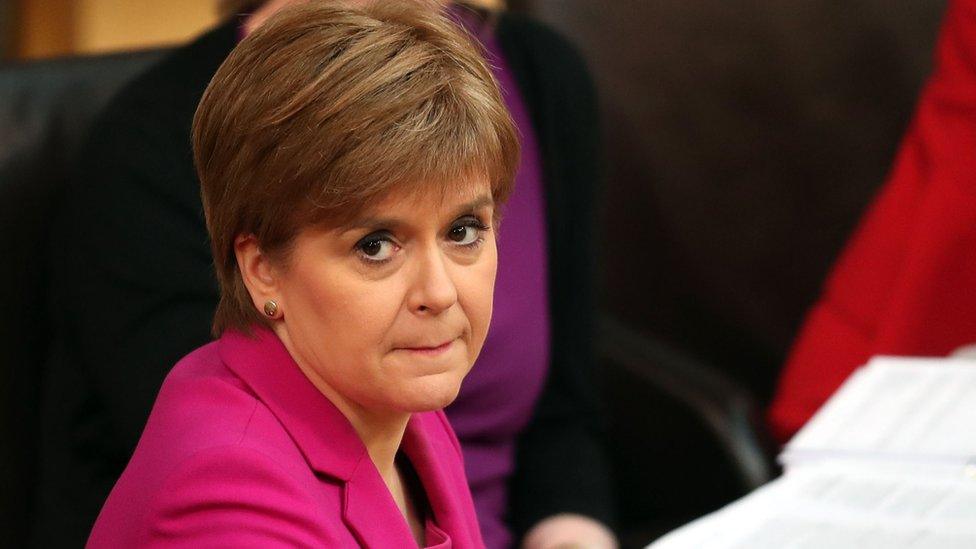Irish border poll unlikely, but possible
- Published

Nicola Sturgeon's has called for a second Independence Referendum
A bewildering list of developments has contributed to a sense that perhaps the political tectonic plates are on the move.
It includes:
Scottish First Minister Nicola Sturgeon's call for a second independence referendum
Sinn Féin Stormont leader Michelle O'Neill's reassertion of her party's demand for an Irish border poll
Sinn Fein's strong performance in the Stormont election and recent Irish opinion polls
A promised White Paper on Irish unification from Irish opposition leader Micheál Martin of Fianna Fáil
Last but not least, Taoiseach (Irish Prime Minister) Enda Kenny's announcement of a referendum on extending the franchise for Irish presidential elections.
Certainly, Sinn Féin leader Gerry Adams thinks there has been a shift - last week he told Reuters that the Northern Ireland Assembly election result gave him and his supporters a sense that their long-term goal of Irish unity might be achievable.
Mr Adams also referred to developments on the other side of the Irish Sea, claiming that a decade ago Scottish independence might have seemed a "minority occupation for men in kilts", but now people had bought into the proposition.
On a similar theme, Tony Blair's former spin doctor Alastair Campbell told Good Morning Ulster that in relation to both Brexit and the Trump presidency "we are living in an era in which nothing can be taken for granted".
Drop, cover and hold
On the face of it, there seems much to encourage Irish nationalists and to disconcert Ulster unionists.
But although the needles are twitching on their political Ritcher scales, it is probably not yet time for the unionists to "drop, cover and hold on", the standard advice if caught in an earthquake.
Back in September last year, BBC Northern Ireland commissioned an opinion poll in the wake of the Brexit referendum.
This suggested that 63% of people in Northern Ireland supported staying in the UK whilst only 22% said they would vote to join a United Ireland.
It is entirely possible that, as the practical implications of Brexit unfold, this balance of opinion could shift. However, it is quite a differential for nationalists to overturn.
It would be wrong to assume that the loss of the unionist majority at Stormont in an election, dominated by a backlash to the DUP's style of government, would translate into a border poll.
Brexit may have shaken many people out of their comfort zone. However, any border poll campaign would focus, not just on people's identities and aspirations, but also on the multi-billion pound UK subvention, the future of the health service or the general stability of Northern Ireland.
At Stormont, it is the "others" who hold the theoretical balance of power and it is probable that many of their supporters might find the status quo more attractive than a step into the unknown.
One aspect of the Scottish debate which may have resonance in Northern Ireland in the coming months and years might be under whose authority a referendum can be called.
Ms Sturgeon has indicated she wants a vote between the autumn of 2018 and the spring of 2019, but it is up to Downing Street to grant the Section 30 order which would make the exercise legally binding.

Gerry Adams said the assembly election gave him and his supporters a sense that their long-term goal of Irish unity might be achievable
Similarly, under the Good Friday Agreement, it is up to the UK government, external in the shape of the secretary of state for Northern Ireland to call a border poll "if at any time it appears likely to him that a majority of those voting would express a wish that Northern Ireland should cease to be part of the United Kingdom and form part of a united Ireland".
The agreement is silent on what might inform a secretary of state's decision, but generally it has been assumed to be the decisive result of an election or a consistent run of opinion polls suggesting a majority want change.
One can imagine that, just as Sinn Féin has questioned the Treasury's estimates of the financial subvention, Irish nationalists could disagree with a future Northern Ireland secretary of state on whether the circumstances set out in the 1998 agreement have been met.
In turn, that argument could influence the debate in the run-up to any future border poll.
Back in September last year I wrote that I did not expect to find myself covering a border poll in my tenure as BBC NI political editor.
But maybe - given the recent seismological movement - I shouldn't rule anything out for certain.